Join 40,000+ sales and marketing pros who receive our weekly newsletter.
Get the most relevant, actionable digital sales and marketing insights you need to make smarter decisions faster... all in under five minutes.
How Inbound Marketing Grew My Spotify Playlist Following

Oct 12, 2017
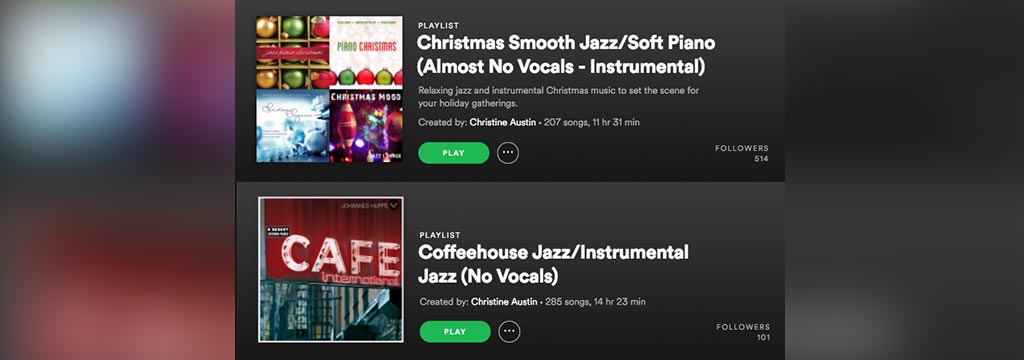
"Music is an integral part of life, day in and day out," said Jeff Levick, Spotify's chief revenue officer.
It’s the special ingredient that fuels our workouts, car rides, walks in the park, and if you're like most of us at IMPACT, feeds our productivity at work.
The music service giant now has 140 million monthly active users and it's a go-to for collecting and creating your favorite music in playlists, but I think it's safe to say the majority of us don't think about others following those playlists as well.
We think about ourselves and what’s going to make the best playlist for our own needs.
That’s exactly the approach I took with my playlists -- until last year.
As someone who has a soft-spot for instrumental tunes; jazz, ambient music, or even nature sounds, I was whipping up playlists left and right, specifically to help me focus more at work.
Then I noticed something. In my haze of making playlists that were accurately named for my own needs, the following on one of them was growing rapidly.
With a group of watchful eyes now on my ‘Christmas Smooth Jazz/Soft Piano (Almost No Vocals - Instrumental)’ playlist, I thought to myself ‘why not see how inbound marketing can help it reach more people’?
And so it started.
I started a personal inbound marketing strategy to see how much I could grow the playlist, and to my surprise, it’s been working flawlessly.
Here's the story:
1. First, I Set Objectives
If you’re trying to get from point A to B, you need to know what point B looks like before you start doing work you think will get you there.
This typically means you set specific marketing objectives that align with your business goals. Then, create a plan so you know the tasks to focus on for the quarter that correlates back.
Seeing this as a similar strategy you'd use to gain social media followers, I created my objectives around expanding the playlists reach (especially since connecting revenue back to a Spotify playlist is a little challenging).
I also knew my playlist was seasonal, so its potential for performing well only existed from August to early January. And I needed to anticipate the loss of followers once the season ended as well.
Which each of these things in mind, my objective was simple - to increase followers. When reviewing past goals I saw the followers increase like so
- 2015: 0 - 150
- 2016: 112 - 500
For this year, my lowest point was 405, and my newest objective is to hit 1000 total.
But getting to that number isn’t easy to hit without creating a plan. Otherwise, you run in 20 different directions hoping a couple of them help instead of focusing on 3.
So my plan was outlined like so:
- Continued optimization of the playlist title to rank higher
- Historically optimize the playlist with newly released music and groom what currently exists.
- Review the content on a weekly basis and add at least 5 new songs per week
- Launch a new playlist with intent on similar success
With the plan outlined, it was time to take the plan step-by-step.
2. Keyword Optimizing the Playlist Title
When you’re new to blogging, it’s easy to get started with bland, generic keywords that you ultimately don’t realize the difficulty of ranking against. Once you begin discovering more specific or long-tail keywords is when you finally begin to find success in the content you are producing.
When I started the playlist, I gave it a somewhat generic title: I decided on ‘Christmas Smooth Jazz'. To the point? Yes. And although it was gaining a very small following, it wasn't growing at a steady pace.
I knew the titles weren’t descriptive enough so it was clear they had to be changed, but before doing so, I needed to check the competition; who was I ranking against?
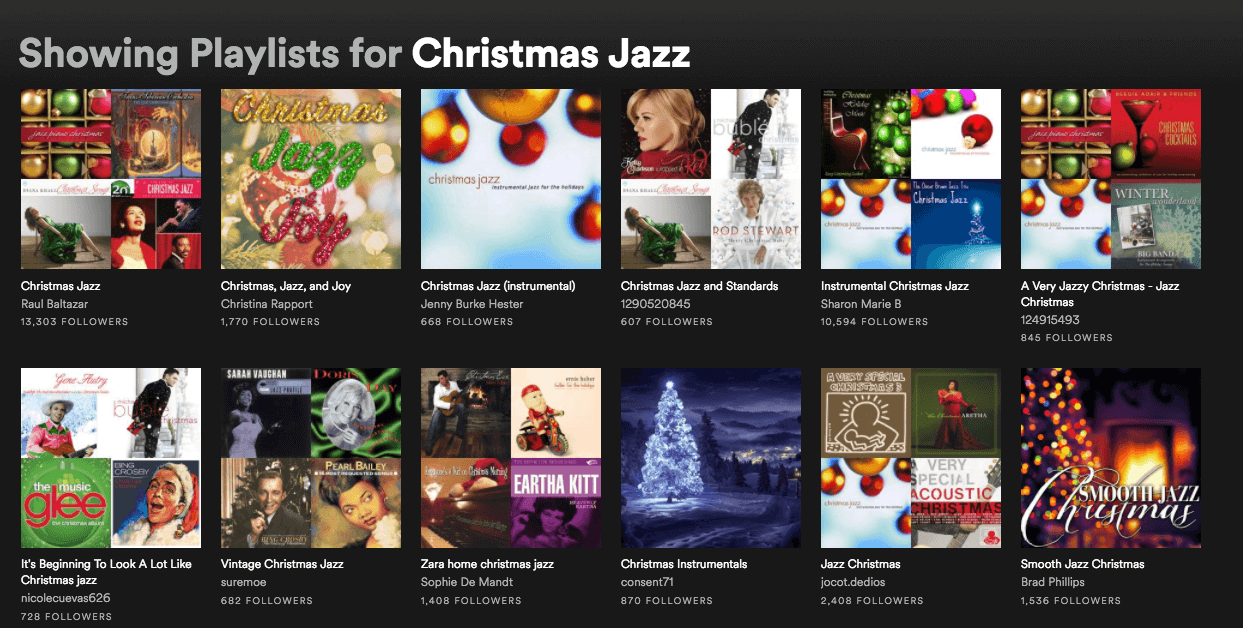
Yikes, competing against ‘Christmas Jazz’ was going to be a challenge. But ‘Smooth Jazz’ was in the original title, so I took a step back, and checked the rankings for ‘Christmas Smooth Jazz’.
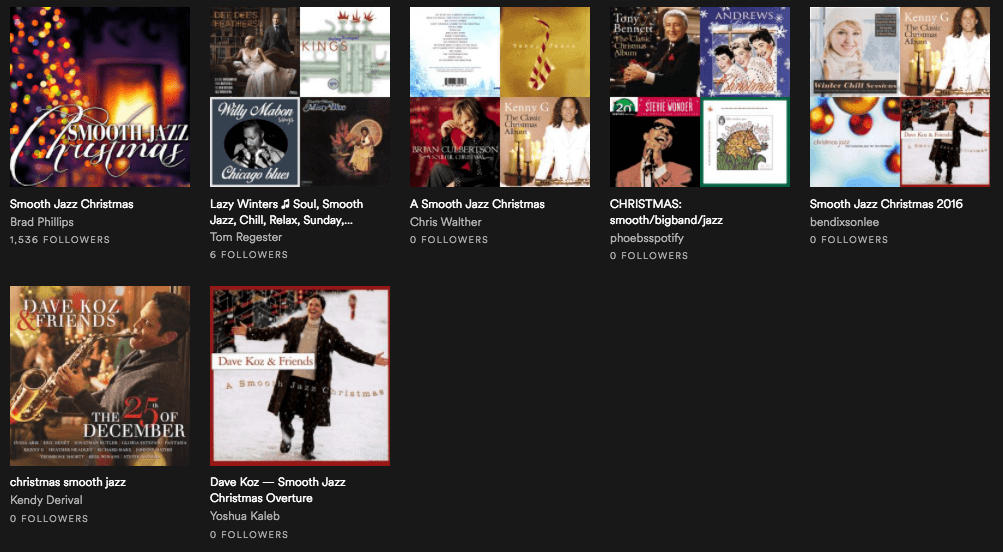
Only one big player, which I knew gave me leverage to create something in this space. But I didn’t want to become pigeon-holed, so I thought about similar keywords others would look for. Since smooth jazz tends to take on a more instrumental form, I wondered if people had tapped into that space. So I headed back and searched.
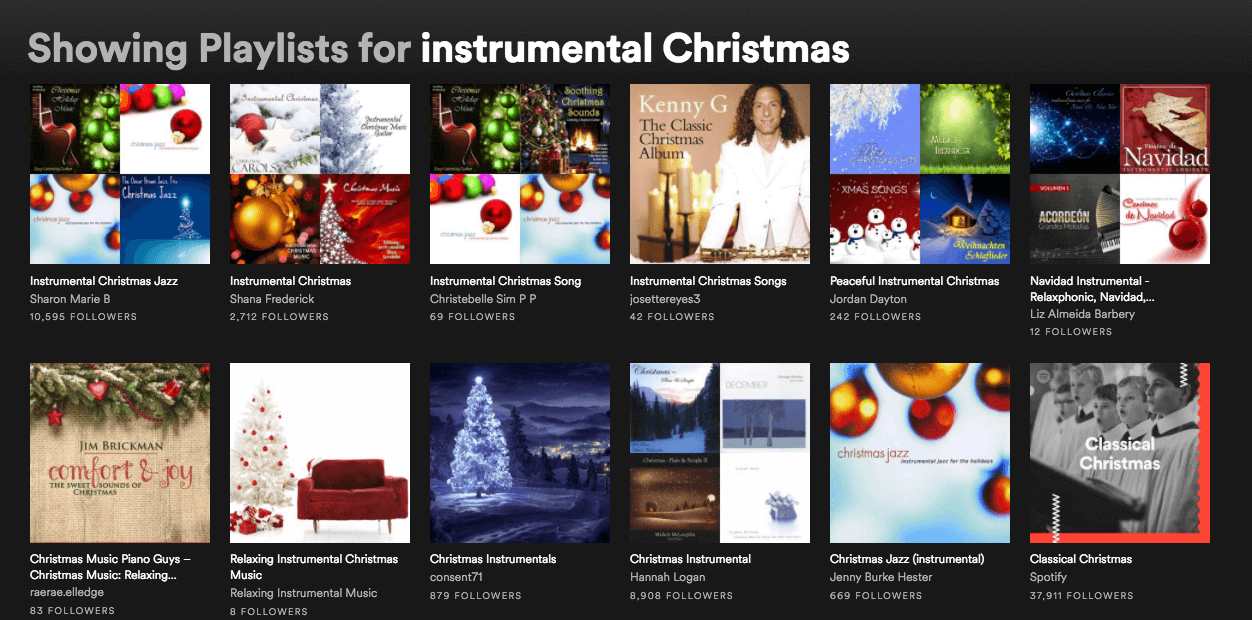
I then started to see a bit more steep competition and wondered if I really was going to have the chance to pass playlists that already had thousands of followers. I decided to do one last check and actually start listening to some of these playlists, and to my surprise, some actually had songs with vocals.
This led me to believe I had a chance. I felt I found a niche with the lack of ‘Christmas smooth jazz’, one that had the potential to capture people looking for more choices for their winter holiday soirees and gatherings.
So to best optimize the title, I decided to go keyword heavy. With that in mind, ‘Christmas Smooth Jazz/Soft Piano (Almost No Vocals - Instrumental)’ was born. After this change in mid-October of 2015, I had capped out at 150 followers in January of 2016.
But title optimization and leaving it alone wasn’t enough, I knew I needed to add the best content, and it was on me to make sure that that happened.
3. Creating a Kick-ass Playlist (a.k.a. Remarkable Content)
For almost all content, the title continues to be the hook that attracts leads to your pages. But if the user begins reading or listening to the on-page content before converting, and it doesn’t resonate with the title, or seems outdated, then your visitors will surely leave.
The bottom line is the content you're publishing needs to be remarkable and align with the keywords (or title) you are ranking for. The same principles needed to be applied to this playlist if I want it to succeed.
With the title in mind, I exactly what type of content needed to be feed into the playlist to align with listener expectations.

Like with the playlist title, this also meant checking out what other playlists contained & adding some of what they had to mine, then, individually researching these artists to check for related ones.
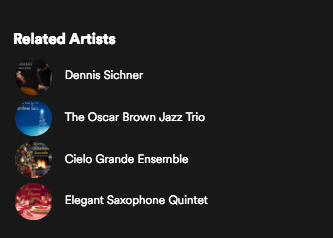
This process is no different when creating a new offer you want to check the competition on. Once you see what competitors are putting out, you need to take the next step with your content so it ranks above the rest.
But creating high-quality content is only half the battle in marketing. Next comes keeping it up and nurturing your audience with content that upholds the same, if not better, quality than what introduced them to you in the first place.
4. Nurturing My Following
Regularly producing, updating, and historically optimizing your content are vital pillars within the content marketing space that helps to attract new visitors and keep your returning audience engaged.
With a Christmas playlist, there is a seasonality challenge (similar to content that’s time-based) where I only have a few months to capitalize on increasing and nurturing the followers. Come off-season, I start to lose followers (around 20% each year).
When the season comes back around (as early as August/September believe it or not) is when I begin heading back to review and updating the playlist.
This meant adding new music that came out from the previous season, filtering out music that may appear too many times, and double checking that what I’m adding continues to hit the expectations the playlists name defines.
Similar approaches need to be taken with your own content. If you see something performing exceptionally well, but notice the publish date seems old, or its SEO ranking is starting to take a hit, take the time to update it. Republishing with updated content helps increase the chances your search engine ranking will increase or hold at #1 in Google and other search engines.
5. Recreating the Success
When your done working on a large project, whether it's for a client or personal, you don’t close the book once the end date arrives. Instead, you sit down and review what you did, what goals you did or didn’t hit, analyze why, and what can you do for the next quarter to make sure that success continues.
Since I knew I already capitalized on the smooth jazz space, I determined that creating a new playlist that's non-seasonal in the same genre would be the best in achieving similar success.
After a year of going through these essential inbound marketing steps again, my playlist ‘Coffeehouse Jazz/Instrumental Jazz (No Vocals)’ now has 102 followers as of this day. While the number may dwarf in comparison to the 10k follower playlists, I’m hoping some optimization and content improvement will help continue to improve the ranking.
Key Takeaways
Inbound marketing comes into play in so many different aspects of how we live our life in this digital age, often times in places we wouldn’t normally think.
But, whether it be a Spotify playlist, a blog article, or a new eBook, little things like optimizing your content for its specific audience, taking the time to develop quality content hitting known pain points, and keeping that quality content fresh and updated can go a long way.
Don’t forget about marketing to your current customers, either. They are the ones you will become the evangelists for your brand and bring in some of the best followers and future advocates.
Free: Assessment